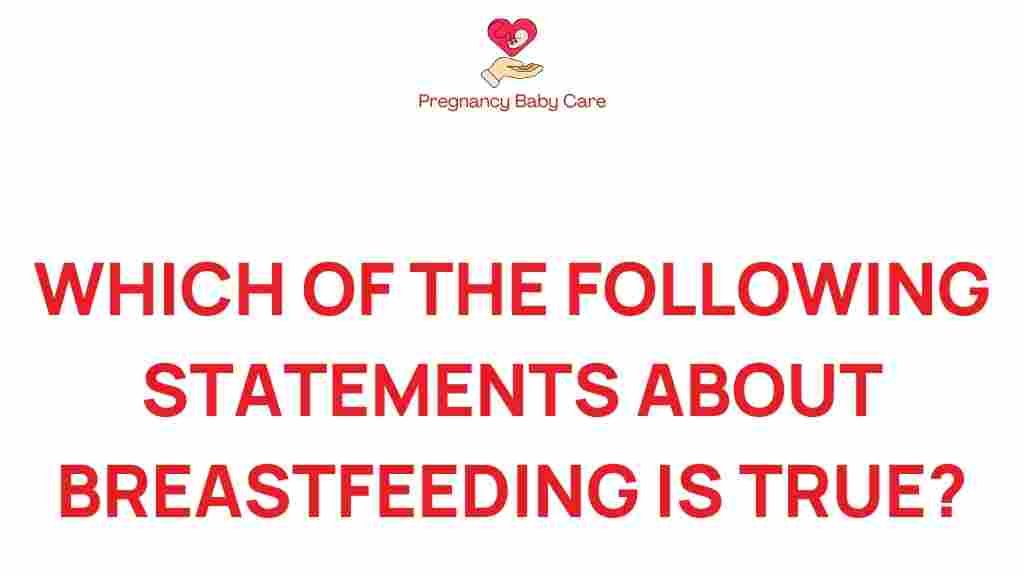Unraveling the Truth: What You Really Need to Know About Breastfeeding
Breastfeeding is a natural process that provides essential nutrition to infants and has numerous benefits for both mothers and babies. Despite its importance, there are many myths and misconceptions surrounding breastfeeding that can lead to confusion and anxiety for new mothers. In this comprehensive guide, we will explore the facts about breastfeeding, address common myths, discuss maternal health and infant nutrition, and highlight the benefits and challenges of breastfeeding. By the end of this article, you will have a clearer understanding of breastfeeding and be better equipped to navigate the journey of lactation.
Understanding Breastfeeding
Breastfeeding is the process of feeding an infant with milk produced by the mother’s breasts. This natural act is recommended by health professionals globally due to its significant health advantages for both the mother and the child. However, it is often surrounded by various myths that can discourage mothers from pursuing this beneficial practice.
Common Myths About Breastfeeding
Let’s debunk some of the most common myths about breastfeeding:
- Myth 1: Breastfeeding is easy for everyone.
- Myth 2: Formula feeding is just as good as breastfeeding.
- Myth 3: You can’t breastfeed if you have flat or inverted nipples.
- Myth 4: Breastfeeding means you can’t drink alcohol.
- Myth 5: You need to have a perfect diet to breastfeed.
Facts About Breastfeeding
Now that we’ve addressed some myths, let’s look at the facts surrounding breastfeeding:
- Fact 1: Breast milk contains all the necessary nutrients for infants.
- Fact 2: Breastfeeding can significantly reduce the risk of certain diseases in both mothers and infants.
- Fact 3: Many women face challenges with breastfeeding, but support is available.
- Fact 4: Breastfeeding promotes bonding between mother and child.
- Fact 5: Public perception of breastfeeding is evolving, with increasing support for breastfeeding in public spaces.
The Benefits of Breastfeeding
Breastfeeding offers numerous benefits, both for maternal health and infant nutrition:
Benefits for Maternal Health
- Weight Loss: Breastfeeding can help mothers lose pregnancy weight more quickly.
- Reduced Risk of Diseases: It lowers the risk of breast and ovarian cancer, as well as type 2 diabetes.
- Emotional Well-being: The act of breastfeeding releases hormones that promote bonding and emotional health.
- Cost-Effective: It eliminates the need for formula, saving families money.
Benefits for Infant Nutrition
- Complete Nutrition: Breast milk provides the perfect balance of nutrients for growth and development.
- Immune Support: Breastfeeding boosts the infant’s immune system, protecting against infections.
- Reduced Allergies: It may lower the risk of allergies and asthma in children.
- Enhanced Brain Development: Breastfeeding has been linked to improved cognitive development.
Breastfeeding Challenges
While breastfeeding is beneficial, many mothers face challenges. Understanding these challenges can help in finding effective solutions:
Common Challenges
- Painful Nipples: This can occur due to improper latch or positioning.
- Low Milk Supply: Some mothers may struggle to produce enough milk.
- Time Commitment: Breastfeeding can be time-consuming, especially in the early weeks.
- Social Pressure: Mothers may feel judged for breastfeeding in public or for their feeding choices.
Troubleshooting Tips
If you encounter challenges while breastfeeding, consider the following tips:
- Seek Support: Join a local breastfeeding group or consult with a lactation consultant.
- Practice Proper Latching: Ensure the baby is latching correctly to avoid pain and maximize milk transfer.
- Stay Hydrated: Drink plenty of fluids to support milk production.
- Be Patient: Breastfeeding can take time to master; be kind to yourself during this learning process.
Public Perception of Breastfeeding
Public perception of breastfeeding has evolved significantly over the years. Many communities now support breastfeeding mothers, recognizing the importance of infant nutrition and maternal health. However, challenges remain:
Changing Attitudes
- Increased Awareness: Education about the benefits of breastfeeding has influenced public opinion positively.
- Supportive Policies: Many workplaces are implementing policies to support breastfeeding mothers.
- Social Media Influence: Online platforms have created communities that advocate for breastfeeding and share positive experiences.
Remaining Challenges
- Stigma: Some mothers still face stigma for breastfeeding in public.
- Lack of Support: Not all healthcare providers offer adequate support for breastfeeding.
- Formula Marketing: Aggressive marketing of formula can undermine breastfeeding efforts.
Conclusion
Breastfeeding is a vital aspect of maternal health and infant nutrition that comes with numerous benefits. By unraveling the truth about breastfeeding, addressing myths, and understanding the challenges, mothers can make informed choices. Support from family, friends, and healthcare providers is crucial in fostering a positive breastfeeding experience. Remember, every mother’s journey is unique, and finding the right path for you and your baby is what truly matters.
For more information on breastfeeding support, visit Breastfeeding Resources. If you are looking to connect with local breastfeeding groups, consider checking out Lactation Support Community.
This article is in the category Feeding and created by PregnancyBabyCare Team
